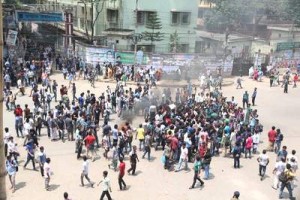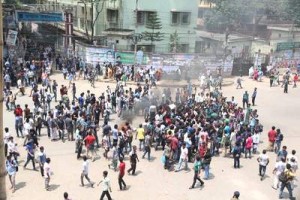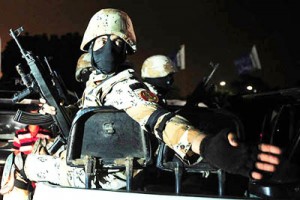Wall Street Journal
SALIL TRIPATHI
 The machetes have struck again in Bangladesh. Late Wednesday, a group of men surrounded Nazimuddin Samad, a 28-year-old law student, slashed his head, then shot and killed him. There have been no arrests so far, and no one has claimed responsibility.
The machetes have struck again in Bangladesh. Late Wednesday, a group of men surrounded Nazimuddin Samad, a 28-year-old law student, slashed his head, then shot and killed him. There have been no arrests so far, and no one has claimed responsibility.
Mr. Samad wrote frequently on social media and he campaigned for a secular republic. He also criticized religion and was part of the Shahbag Movement, which seeks strict punishment, including the death penalty, for those guilty of war crimes during Bangladesh’s 1971 war for independence.
Since 2013, seven secular figures—writers, bloggers, activists—have been murdered in Bangladesh. Seven more have been attacked and injured. In some cases, a militant Islamic group has claimed responsibility.
The government’s response has been inept and inadequate. The authorities have made a few arrests, but for the most part have focused on cautioning the bloggers not to write on controversial subjects. The state has also prosecuted some bloggers for hurting the country’s religious sentiment.
Meanwhile, hit lists of dozens of bloggers and free thinkers circulate in Bangladesh. Many bloggers have sought asylum abroad.
Last week, at a conference in Paris bringing together exiled writers and their supporters, I met several Bangladeshi bloggers who now live abroad. One had been attacked physically, one arrested and tortured, and a few had managed to get out before they could be harmed. They remain committed to their beliefs, and continue to publish.
These courageous writers should be able to operate freely and without fear in their own country. Bangladesh’s government has failed them in its most basic responsibility.
On his Facebook page, Mr. Samad described religion as a tool of oppression for the powerful. He called for the removal of Islam as Bangladesh’s state religion. One of his friends told Britain’s The Daily Telegraph that last year Mr. Samad had been attacked in Sylhet, soon after another blogger, Ananta Bijoy Das, was murdered there.
These killings are all part of a pattern that make for a gruesome, unresolved story going back to Bangladesh’s birth. On the one hand, there is the conflict between religious fundamentalists and atheists, or writers who describe themselves as free thinkers. This is part of a larger conflict, between fundamentalist Islam and its opponents. The blog Mukto Mona, or Free Mind, which published some of the slain writers, has in the past praised the French magazine Charlie Hebdo.
But two other tensions in Bangladesh play into this conflict. One is the debate over the nature of the state. Is Bangladesh a country of Muslims or of those speaking Bengali? The dream of 1971 was to create a syncretic, inclusive nation. Pakistan—of which Bangladesh was a part since 1947—forced them to emphasize religion over Bengali identity.
The other clash is over justice for past crimes. Should those responsible for heinous acts during the 1971 war be held accountable? Or should they be allowed to escape with impunity?
Despite initially opting for secularism, several coups soon followed independence in Bangladesh. The constitution was changed, eventually making Islam the state religion. Those suspected of having collaborated in war crimes during the civil war, many of them Islamists, evaded punishment. Some were even appointed to ministerial positions. But the present government is now bringing some of the accused to justice.
All of the slain bloggers and publishers opposed the creation of an Islamic state. But more critically, they vigorously supported the war-crimes trials. This arguably poses the biggest threat to the Islamist movement in Bangladesh.
Many Bangladeshis, including many devout Muslims, want justice for the 1971 atrocities. In every district of the country there are families that have lost loved ones, women who were raped, people whose lives were devastated by that war. They seethe with resentment as they watch individuals they know perpetrated crimes or benefited from them escape justice. They naturally want the tribunals to continue their work.
To be sure, international human-rights groups have criticized the tribunals for procedural flaws, and in several cases the flaws are serious. In one instance, a judge had to step aside after recordings emerged in which he consulted with activists who were campaigning for harsher punishment. In other cases witnesses have turned hostile. There have been discrepancies in evidence.
Fundamentalist Muslims are also angry. They want to regain their influence. The bloggers, like many Bangladeshis keen to preserve a secular republic, want the government to be firmer in defending secularism.
These three distinct narratives—the nature of justice, the role of religion and the basis of national identity—have created a deadly confluence. In such a volatile environment, the government is unable to protect writers or stop the machetes.




